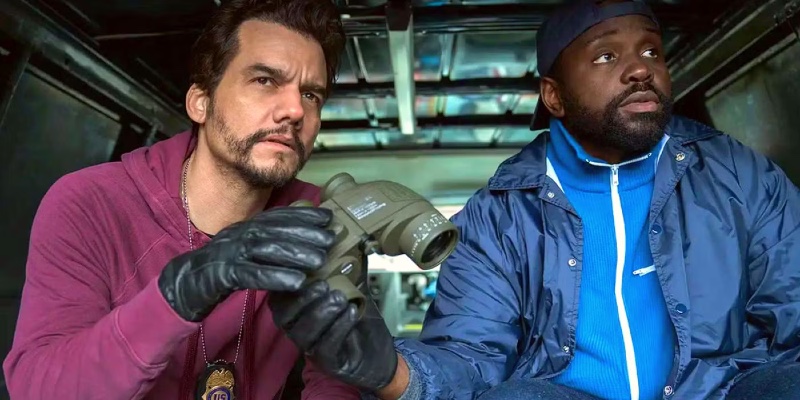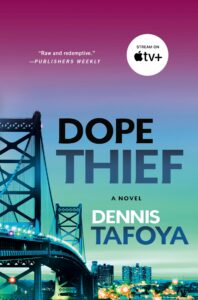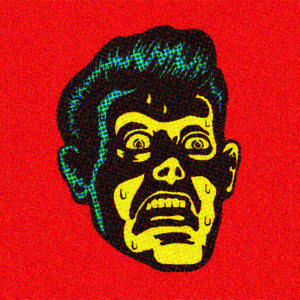The miniseries Dope Thief premiered on Apple TV+ recently, something exciting for crime fiction fans. It’s adapted from the novel by Dennis Tafoya and created by Peter Craig, with Ridley Scott serving as one of the executive producers. Scott also directed the first of the series’ eight episodes. To discuss the book and the series, I talked with Tafoya, and he was quite forthcoming about the long, winding, unpredictable journey Dope Thief took from its initial publication to its appearance as a drama on television screens.
Scott: Let me start by saying congratulations on the series adaptation of Dope Thief. Very exciting. But to start, let’s go back to the beginning. You wrote Dope Thief many years ago now — the novel came out in 2009 — and I’m wondering: Can you even remember how you came to write the novel? What were the inspirations and some of the ideas behind it?
Dennis: I think at the time I was such a huge fan of folks like Elmore Leonard, Lawrence Block, Charles Willeford that I knew I wanted to write about crime and criminals. And I loved crime movies, stuff like To Live and Die in LA, and Drugstore Cowboy, and older classics like Gun Crazy and Asphalt Jungle and High Sierra (That searing Ida Lupino line – “What does it mean when a man crashes out?”) Not to mention all the great nonfiction crime with pulpy covers that I consumed, by folks like Jack Olsen and Anne Rule and Tim Cahill. I think that what I loved to read, the movies I loved, coupled with some of my own experiences working in a hospital and conversations with my uncle, who knew a lot of pretty crazy characters and stories from his neighborhood in South Philly, all of that comes together alchemically when you’re writing, trying to make something people might find interesting.
Scott: You mention Philadelphia, which is the central location for the novel. But I like too how you incorporate rural parts of Pennsylvania into the story. It’s been years since I read the novel, but I remember thinking as I was reading that the parts taking place outside Philly, in more remote parts of PA, were interesting precisely because it’s not commonly covered crime fiction geography. There was Witness back in the eighties, taking place in Amish country, and more recently Mare of Easttown (however accurate that is in its depiction of small town Pennsylvania), but I recall thinking that I hadn’t ever spent much time in this locale. All this nasty stuff going on outside the big bad city. Was this stuff you’d researched? If I’m not wrong, you’d lived in more rural parts of the state, no?
Dennis: Yeah, the book spent a lot more time in Bucks and Montgomery counties, places closer to where I grew up. In the 70’s and 80’s, Philadelphia-area biker gangs like the Pagans and the Warlocks were deep in the meth business, first by controlling supplies of P2P, a key ingredient, then in distribution. Bikers would rent rural farmhouses and cook meth, then abandon them. When I was working in the ER in the early 80’s, a meth lab burned in upper Bucks county and we got calls through the night from people who had a friend badly burned when the lab went up. The nurses tried to get them to bring the guy to the ER or leave him somewhere an ambulance could pick him up, but he was later found dead from his injuries. That story was something I held onto a long time that eventually found its way into Dope Thief. The folks in Dope Thief can be found in any hard-luck area, rural or suburban, like people I hung out with who lived along the Delaware or in working class towns like Warminster or down in Bristol and Langhorne, closer to Philly.
Mare of Easttown occupies a kind of funny space – the real Easttown is a rural township near the Main Line, a green space where there’s a huge national horse show every year. The TV show looks more like communities like Eddystone or Marcus Hook. Maybe HBO didn’t like Mare of Eddystone as much.
Scott: Ha, who knows? In Dope Thief, the premise, very quickly, is about two guys, Ray and Manny, best friends and both with some prison time in their pasts, who impersonate DEA agents to rob drug dealers. And things go pretty well until, inevitably, they make a big score but it’s against the wrong people. Some very dangerous people. Things spiral from there as they have to elude the ones they robbed and the real DEA. Was this dangerous modus operandi they have something you discovered in research or just made up yourself? It certainly has the feel of authenticity in the book.
Dennis: Pretty much all the crime authors I know start with true stories. The DEA scam is something I’d run across before. For some reason there were a lot of folks impersonating police officers in Florida in the 80s, including William Matix and Michael Platt, two guys who started out robbing dealers and ended up robbing banks and getting into one of the most violent shootouts in FBI history. At one point while I was writing Dope Thief, I wondered if biker crews still engaged in the kind of violence I was depicting, and then the Shedden massacre hit the news. Eight members of the Bandidos club had been murdered on a farm in rural Ontario. It at least confirmed that there was still pretty serious violence connected to the biker drug trade. It’s really important to me to get things as right as I can. Obviously I’m turning these things into fiction divorced from the actual lives and motivations of the people involved, but I want for the action of my books to seem like things that might occur in the world these characters inhabit.
Scott: So the book comes out, and that’s always at least somewhat exciting, no matter how many books you’ve written, but there’s nothing like putting out your first novel. You have excitement and perhaps some trepidation? What will the reaction be? Will it sell well? What will friends whose reading judgment you respect think? I imagine there must have been a lot swirling around in your head. What were thoughts when the book was released and how did the actual reaction, whatever it was, from other writers, reviewers, strangers, mesh or not with what you anticipated? And what about the commercial aspect. Did that go in any way like you expected, if you were expecting anything in that regard?
Dennis: Wow, yes, when you’re waiting for a reaction to your first book you’re imagining all kinds of wild things. It’s a wonderful, but also terrifying time. I used to joke that I was fine with publishing a novel as long as I could stand over the shoulder of every reader and explain what I was trying to do. Ultimately, I found the book was received well enough in the crime community, but pretty much unknown otherwise. That’s when you begin to realize that for most of us, the reward is gaining entry into a fantastic group of writers. I sure wouldn’t mind being a bestseller, but you release this thing into the wild and it finds its way, or not, and that’s ok.
Scott: Several years went by, and two more novels by you came out, The Wolves of Fairmont Park, in 2010, and The Poor Boy’s Game, in 2014. Both are set in Philadelphia, and both are very good, by the way. Want to talk a little bit about how you saw your writing “career” going at that point? Like most writers, you had a full time job through all this, but you’re doing what most of us do, carving out time to plug away at your books. And Dope Thief at this point was…what? Optioned already?
Dennis: Thanks to my amazing film agent, Brooke Ehrlich, Dope Thief was optioned several times. It’s something that happens for a lot of authors and by no means insures that there will be much movement toward actual production. It usually means a small payment, which can be a nice boost for working authors with day jobs, especially. Or not – one more frustrating version of the option is the ‘shopping agreement,’ where typically no money changes hands. In the case of my second novel, we entered into a shopping agreement with a brand name director who, his staff assured us, ‘wants to see this on screens by September.’ Of course that went nowhere. Anyone who’s been through the process knows that it rarely leads anywhere (a friend of mine uses the term, ‘many chips flying, few trees falling,’ which I think sums it up nicely). It’s fun to dream, though. It’s hard not to take it to heart, but I certainly had no expectation that I’d ever see any of my books onscreen.
Scott: How then did it come about that Dope Thief was adapted as a series for Apple TV? This was many years after the book had first come out.
Dennis: My agent was in a meeting with Apple execs who were looking for a crime project for Peter Craig. Peter had written the screenplays for The Town and Top Gun: Maverick, among others. She gave them the manuscript for Dope Thief, which was a pretty amazing thing for an agent to do with a twelve-year-old book. But she’s an amazing agent. The wild thing to me was that Peter had been a crime novelist at the beginning of his career and we had friends in common. About eight years earlier, my wife had taken a picture of my book The Poor Boy’s Game in the ‘Staff Recommends’ section at BookPeople in Austin. The bookseller, Scott Montgomery, had written that if you liked my book, you’d like Peter Craig’s Blood Father, which was a pretty wild coincidence. And I had read Blood Father, so I knew Peter understood the characters I wrote about and was a perfect choice to turn my book into a TV show. (It’s also worth mentioning that Scott Montgomery is a treasure).
Scott: Then I suppose came a waiting period as the making of the series got underway. So much waiting when you’re a writer, no matter what level of anything you’re involved in. What was that like and were you sort of like, with mounting excitement, ‘Oh, Ridley Scott is the executive producer, so you know this will be a topnotch production. And oh, they cast Brian Tyree Henry as one lead and Walter Moura as the other lead. I can see them as the characters.’ Across the board, I have to say, the casting is very good.
Dennis: It was a long process, a long time between the initial agreement and the final contracts and then until production began. For a good part of that there was an embargo on information from Apple, so when I told my friends, oh, yeah, my ten-year-old novel is going to be on Apple TV+, Ridley Scott is producing and directing, and the guy who wrote Top Gun: Maverick was the showrunner, I think I must have sounded delusional. Brian Tyree Henry is one of those guys who’s just always compelling, and I was a massive fan of Wagner Moura from having watched Narcos end to end about five times. And the cool thing is that every single review seems to focus on the chemistry between those two actors. And the relationship between Brian’s character and Kate Mulgrew as his mother. I think of every character that made the leap from the book to the show, she was my favorite. The character of Theresa is based on (and named after) my grandmother, and it was very cool to get a chance to tell Kate Mulgrew that her performance really captured how I remember her. Like Kate’s character, she took no shit.
Scott: Kate Mulgrew is great. And I agree: the relationship between her character and Brian Tyree Henry’s character is one of the best things about the show. I love how at first it’s not spelled out what exactly their connection is, but you come to understand it gradually. And it’s very real, how they rib and pester each other like people who are that close really do.
I also like the Vietnamese drug trafficker’s character a lot. He’s got a kind of self-control that’s admirable. Very well-played by Dustin Nguyen.
So the production is finally underway, and everything is on track and then the Writer’s Guild strike hit, suspending production. An understandable strike, and as a writer you must have been on the writers’ side, but a part of you must also have been thinking, “I can’t believe this. Will it get finished?” Back to…waiting.
Dennis: I was 100% on the side of striking writers and actors, but sure, it was stressful waiting it out, though nothing compared to people whose livelihoods were on the line. Everyone involved felt strongly that Apple would continue production, but it was good to get confirmation when they started to shoot again. Ultimately, they filmed four episodes before the strike and four after, with a delay of almost exactly a year in between.
Dustin Nguyen is an incredible presence. He does have that quality of understated power that is perfect for the role of Son Pham. All of the Vietnamese cast members are top-notch. I was on set the day they filmed the second episode scenes where Ray visits Son’s house, and it was so much fun to watch. The two kids, played by Emma Lewis and Jaba Keh, were total troupers, never missing a beat and flawlessly recreating their lines and moves as the crew filmed the same actions over and over from different angles. And Phong Le, Son’s bodyguard, was so wonderfully sinister, though in real life he’s such a kind, thoughtful guy. I also have to mention Kieu Chinh, who plays Dustin’s mom. She’s a legend who’s been acting in Vietnamese and American movies since the 60’s.
Scott: It’s been a long journey from the novel’s publication to its coming to the screen as a series, but if nothing else, it does show that once a novel is out in the world, it doesn’t truly die. You never know what will happen to it. And now there’s a new edition of the novel, thanks to the series, which is a pleasing development. Before we end, though, I’m curious. Did you get to watch any of the completed episodes with Peter Craig or any of the cast members or anyone else involved in the series’ making?
Dennis: No, I watched a screener at home. In the spirit of complete disclosure, I had to wait for the regularly released version to get the complete experience because I’m hard of hearing and needed the subtitles. Even so, watching the first episode at home with my wife was definitely one of the most surreal and gratifying experiences I’ve had in my writing life. Though nothing will top getting an email from my seventh-grade English teacher giving me a very belated ‘A+’ for the novel.
Scott: If that’s not validation, what is? All this has to charge the batteries. And so, fresh off the excitement of all this happening, what’s next? Do you have a new novel in the works?
Dennis: I’m working on a novel set in the late 1940s, about a gang of vets committing armed robberies in the Southwest. Doing a lot of research and there are some characters based on real figures of the period. It’s an area and a time I love, and writing it is an excuse to hang out in the desert again. If it all goes to plan, there’ll be characters having drinks at the Zebra Room and then wild firefights in little Mojave towns. Hope people find it fun.


















